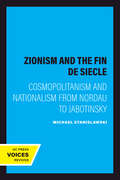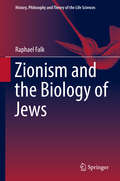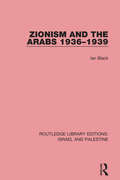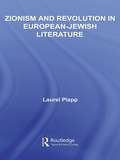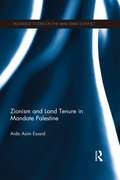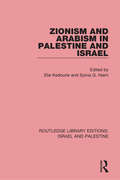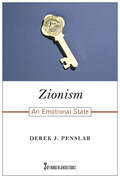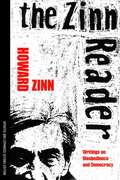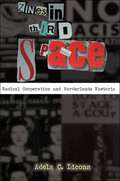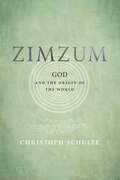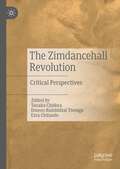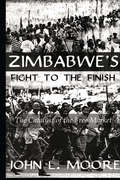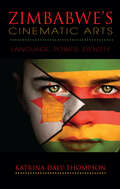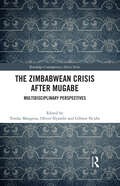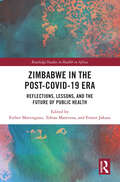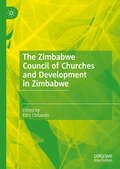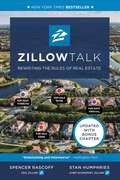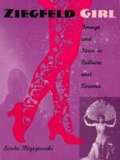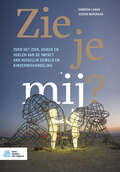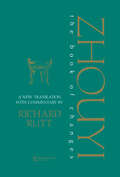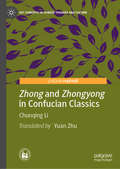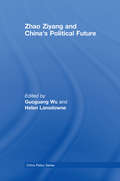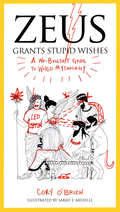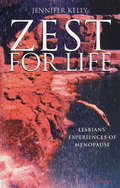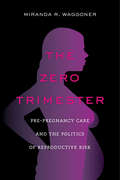- Table View
- List View
Zionism and the Fin de Siecle: Cosmopolitanism and Nationalism from Nordau to Jabotinsky
by Michael StanislawskiMichael Stanislawski's provocative study of Max Nordau, Ephraim Moses Lilien, and Vladimir Jabotinsky reconceives the intersection of the European fin de siècle and early Zionism. Stanislawski takes up the tantalizing question of why Zionism, at a particular stage in its development, became so attractive to certain cosmopolitan intellectuals and artists. With the help of hundreds of previously unavailable documents, published and unpublished, he reconstructs the ideological journeys of writer and critic Nordau, artist Lilien, and political icon Jabotinsky. He argues against the common conception of Nordau and Jabotinsky as nineteenth-century liberals, insisting that they must be understood against the backdrop of Social Darwinism in the West and the Positivism of Russian radicalism in the fin de siècle, as well as Symbolism, Decadence, and Art Nouveau. When these men turned to Zionism, Stanislawski says, far from abandoning their aesthetic and intellectual preconceptions, they molded Zionism according to their fin de siècle cosmopolitanism. Showing how cosmopolitanism turned to nationalism in the lives and work of these crucial early Zionists, this story is a fascinating chapter in European and Russian, as well as Jewish, cultural and political history.
Zionism and the Biology of Jews
by Raphael FalkThis book offers a unique perspective on Zionism. The author, a geneticist by training, focuses on science, rather than history. He looks at the claims that Jews constitute a people with common biological roots. An argument that helps provide justification for the aspirations of this political movement dedicated to the return of the Jewish people to their homeland. His study explores two issues. The first considers the assertion that there is a biology of the Jews. The second deals with attempts to integrate this idea into a consistent history. Both issues unfolded against the background of a romantic national culture of Western Europe in the 19th century: Jews, primarily from Eastern Europe, began to believe these notions and soon they took the lead in the re-formulation of Jewish and Zionist existence. The author does not intend to present a comprehensive picture of the biological literature of the origins of a people and the blood relations between them. He also recognizes that the subject is emotionally-loaded. The book does, however, present a profound mediation on three overlapping questions: What is special or unique to the Jews? Who were the genuine Jews? And how can one identify Jews? This volume is a revised and edited English version of Tzionut Vehabiologia shel Hayehudim, published in 2006.
Zionism and the Arabs, 1936-1939 (Routledge Library Editions: Israel and Palestine #15)
by Ian BlackIn this work, first published in 1986, the author shows how the Zionists of the late Thirties related to the Arabs of Palestine and of the neighbouring countries, to what extent they perceived the existence of an ‘Arab Question’, how they defined it and how they dealt with it. The Arab question is as old as the Zionist movement itself. From the moment that Zionists began to immigrate to Ottoman Palestine in the last decades of the nineteenth century, it became apparent that they were not ‘returning’ to an empty land and that they could expect opposition to their enterprise from the inhabitants of the country they considered theirs. Comprising diplomatic, political, social, economic and cultural history, this book is a close analysis of the spectrum of views and opinions pertaining to Zionist relations with the Arabs.
Zionism and Revolution in European-Jewish Literature (Literary Criticism and Cultural Theory)
by Laurel PlappZionism and Revolution in European-Jewish Literature examines twentieth-century Jewish writing that challenges imperialist ventures and calls for solidarity with the colonized, most notably the Arabs of Palestine and Africans in the Americas. Since Edward Said defined orientalism in 1978 as a Western image of the Islamic world that has justified domination, critics have considered the Jewish people to be complicit with orientalism because of the Zionist movement. However, the Jews of Europe have themselves been caught between East and West —both marginalized as the "Orientals" of Europe and connected to the Middle East through their own political and cultural ties. As a result, European-Jewish writers have had to negotiate the problematic confluence of antisemitic and orientalist discourse. Laurel Plapp traces this trend in utopic visions of Jewish-Muslim relations that criticized the early Zionist movement; in post-Holocaust depictions of coalition between Jews and African slaves in the Caribbean revolutions; and finally, in explorations of diasporic, transnational Jewish identity after the founding of Israel. Above all, Plapp proposes that Jewish studies and postcolonial studies have much in common by identifying ways in which Jewish writers have allied themselves with colonized and exilic peoples throughout the world.
Zionism and Land Tenure in Mandate Palestine (Routledge Studies on the Arab-Israeli Conflict)
by Aida EssaidA fundamental aspect of the conflict between Palestinians and Israelis is the territorial dispute which began long before the State of Israel was established. Analysing the land tenure system in Palestine under the administration of the British Mandate, this book questions whether, and to what extent, the land tenure system in Palestine facilitated Zionist land acquisition. The research uses benchmarks elaborated in the guidelines of the United Nations Human Settlements Programme as its analytical starting point, and looks at the formation and implementation of the land tenure system in Palestine. It goes on to place the penetration of Zionism into the land tenure system within the theoretical context of a colonial-settler framework, employing information from land registry records located at the Jordanian Department of Lands. Providing a political-historical analysis of the land tenure system from the end of Ottoman Rule until the end of the British Mandate, this book will be of interest to scholars and students of Middle Eastern History, Imperial and Colonial History, and Middle Eastern Politics.
Zionism and Arabism in Palestine and Israel (Routledge Library Editions: Israel and Palestine)
by Elie Kedourie Sylvia G. HaimThis book, first published in 1982, collects together ten studies from the journal Middle Eastern Studies. They tackle a variety of issues stemming from the conflict between Arabism and Zionism, before and after the creation of the State of Israel. Aspects of Arab- Jewish relations during the Mandate are considered, as are political decisions and diplomatic events that led to the end of the Mandate. After 1948, the diplomatic history of Israel and of the Arab-Israeli conflict are examined.
Zionism: An Emotional State (Key Words in Jewish Studies)
by Derek J. PenslarEmotion lies at the heart of all national movements, and Zionism is no exception. For those who identify as Zionist, the word connotes liberation and redemption, uniqueness and vulnerability. Yet for many, Zionism is a source of distaste if not disgust, and those who reject it are no less passionate than those who embrace it. The power of such emotions helps explain why a word originally associated with territorial aspiration has survived so many years after the establishment of the Israeli state. Zionism: An Emotional State expertly demonstrates how the energy propelling the Zionist project originates from bundles of feeling whose elements have varied in volume, intensity, and durability across space and time. Beginning with an original typology of Zionism and a new take on its relationship to colonialism, Penslar then examines the emotions that have shaped Zionist sensibilities and practices over the course of the movement’s history. The resulting portrait of Zionism reconfigures how we understand Jewish identity amidst continuing debates on the role of nationalism in the modern world.
The Zinn Reader: Writings on Disobedience and Democracy (2nd edition)
by Howard ZinnNo other radical historian has reached so many hearts and minds as Howard Zinn. It is rare that a historian of the Left has managed to retain as much credibility while refusing to let his academic mantle change his beautiful writing style from being anything but direct, forthright, and accessible. Whether his subject is war, race, politics, economic justice, or history itself, each of his works serves as a reminder that to embrace one's subjectivity can mean embracing one's humanity, that heart and mind can speak with one voice. Here, in six sections, is the historian's own choice of his shorter essays on some of the most critical problems facing America throughout its history, and today.
Zines in Third Space: Radical Cooperation and Borderlands Rhetoric
by Adela C. LiconaZines in Third Space develops third-space theory with a practical engagement in the subcultural space of zines as alternative media produced specifically by feminists and queers of color. Adela C. Licona explores how borderlands rhetorics function in feminist and queer of-color zines to challenge dominant knowledges as well as normativitizing mis/representations. Licona characterizes these zines as third-space sites of borderlands rhetorics revealing dissident performances, disruptive rhetorical acts, and coalitions that effect new cultural, political, economic, and sexual configurations.
Zimzum: God and the Origin of the World (Jewish Culture and Contexts)
by Christoph SchulteThe Hebrew word zimzum originally means “contraction,” “withdrawal,” “retreat,” “limitation,” and “concentration.” In Kabbalah, zimzum is a term for God’s self-limitation, done before creating the world to create the world. Jewish mystic Isaac Luria coined this term in Galilee in the sixteenth century, positing that the God who was “Ein-Sof,” unlimited and omnipresent before creation, must concentrate himself in the zimzum and withdraw in order to make room for the creation of the world in God’s own center. At the same time, God also limits his infinite omnipotence to allow the finite world to arise. Without the zimzum there is no creation, making zimzum one of the basic concepts of Judaism.The Lurianic doctrine of the zimzum has been considered an intellectual showpiece of the Kabbalah and of Jewish philosophy. The teaching of the zimzum has appeared in the Kabbalistic literature across Central and Eastern Europe, perhaps most famously in Hasidic literature up to the present day and in philosopher and historian Gershom Scholem’s epoch-making research on Jewish mysticism. The Zimzum has fascinated Jewish and Christian theologians, philosophers, and writers like no other Kabbalistic teaching. This can be seen across the philosophy and cultural history of the twentieth century as it gained prominence among such diverse authors and artists as Franz Rosenzweig, Hans Jonas, Isaac Bashevis Singer, Harold Bloom, Barnett Newman, and Anselm Kiefer.This book follows the traces of the zimzum across the Jewish and Christian intellectual history of Europe and North America over more than four centuries, where Judaism and Christianity, theosophy and philosophy, divine and human, mysticism and literature, Kabbalah and the arts encounter, mix, and cross-fertilize the interpretations and appropriations of this doctrine of God’s self-entanglement and limitation.
The Zimdancehall Revolution: Critical Perspectives
by Tanaka Chidora Doreen Rumbidzai Tivenga Ezra ChitandoZimdancehall is a musical movement in Zimbabwe that has grown significantly since 2010. The Zimdancehall Revolution brings together critical essays on various aspects of Zimdancehall culture by scholars from diverse disciplines. Traditionally, music critics and senior academics have not taken Zimdancehall seriously, regarding it as vulgar, transient, bubble gum, lacking depth, and in short, a fad. There were also allegations that the lyrics influenced factionalism, incited violence and glorified drug use and unbridled promiscuity among the youth. This book affords this movement the protracted intellectual engagement that it deserves and argues that Zimdancehall is more than just a musical genre but an everyday culture, a way of life. The genre’s close association with the ghetto is telling and enables critics to look at it as a social movement, a revolution, or a raw, petulant and raging disturbance of peace by those who live their lives on the margins. It is, thus, a violent irruption onto the public space by marginalised young people whose presence as artistes creating art from the margins, simultaneously as victims and agents, circulating in a geography that escapes the limits of nationalist ideological and physical territory, in a way subverts communitarian prescriptions and allows young people entry into the world, albeit in a painful, tumultuous and violent way. The essays range from the mapping of the genre’s historical development to theoretical interventions in understanding the genre and its relationship with various aspects of the Zimbabwean society like politics, gender, religion, language, dance, cultural values and other genres.
Zimbabwe's Fight To The Finish
by MooreFirst published in 2013. Routledge is an imprint of Taylor & Francis, an informa company.
Zimbabwe's Cinematic Arts: Language, Power, Identity
by Katrina Daly Thompson“A nuanced and convincing approach to evaluating the role of media in shaping African identities.” —James Burns, Clemson UniversityThis timely book reflects on discourses of identity that pervade local talk and texts in Zimbabwe, a nation beset by political and economic crisis. Exploring questions of culture that play out in broadly accessible local and foreign film and television, Katrina Daly Thompson shows how viewers interpret these media and how they impact everyday life, language use, and thinking about community. Thompson offers a unique understanding of how media reflect and contribute to Zimbabwean culture, language, and ethnicity.“Katrina Daly Thompson has made a fine contribution to scholarship on African cinema . . . This is a book that will enrich discussions of African film and media studies for years to come.” —African Studies Review“Thompson analyzes identity discourses through cinematic arts?films, documentaries, television programs, videos?consumed (whether or not produced) in Zimbabwe . . . . Beside bringing issues of race, financing, ethnicity, and language to the discussion, she also considers the 2001 Broadcasting Services Act, which was meant to liberalize the field and stem Western influence . . . Recommended.” —Choice“Katrina Daly Thompson’s study of Zimbabwean film and television presents a valuable addition to the ever-expanding corpus of analytical and historical studies on African film and media.” —Africa“Most compelling in Thompson’s study is her close attention to uses of language and culture, which she argues contest state-defined and state-controlled meaning in broadcast media. Recognizing culture as a socially negotiated process, the book uses critical discourse analysis to interrogate power structures and flows.” ?African Arts
The Zimbabwean Crisis after Mugabe: Multidisciplinary Perspectives (Routledge Contemporary Africa)
by Tendai MangenaThis book examines the ways in which political discourses of crisis and ‘newness’ are (re)produced, circulated, naturalised, received and contested in Post-Mugabe Zimbabwe. Going beyond the ordinariness of conventional political, human and social science methods, the book offers new and engaging multi-disciplinary approaches that treat discourse and language as important sites to encounter the politics of contested representations of the Zimbabwean crisis in the wake of the 2017 coup. The book centres discourse on new approaches to contestations around the discursive framing of various aspects of the socio-economic and political crisis related to significant political changes in Zimbabwe post-2017. Contributors in this volume, most of whom experienced the complex transition first-hand, examine some of the ways in which language functions as a socio-cultural and political mechanism for creating imaginaries, circulating, defending and contesting conceptions, visions, perceptions and knowledges of the post-Mugabe turn in the Zimbabwean crisis and its management by the "New Dispensation". This book will be of interest to scholars of African studies, postcolonial studies, language/discourse studies, African politics and culture.
Zimbabwe in the Post-COVID-19 Era: Reflections, Lessons, and the Future of Public Health (Routledge Studies in Health in Africa)
by Esther Mavengano, Tobias Marevesa, and Ernest JakazaThis comprehensive book brings together reflections, lessons and insights relating to the post Covid-19 era in Zimbabwe. The outbreak of the COVID-19 pandemic has immensely affected all facets of humanity globally. Its impact on Zimbabwe is evident through its effect on socio-economic and education systems, politics, religion, infrastructural development, and health delivery systems. This book provides scholarly introspections into the lessons drawn from the pandemic in an effort to re-imagine the future possibilities of public health in Zimbabwe and beyond. Providing a platform for research that seeks to re-think global public health matters from a Decolonial school of thought, the book asks questions such as: What is the role of religion, linguistics, communication, education, economics, politics, and science in preparing Zimbabwe for possible future pandemics? How can the lessons drawn from the pandemic inform scholars to re-imagine the future trajectories of the country in the various domains? How can researchers evaluate the power and economic dialectics of COVID-19, navigate the tumultuous challenges generated, and come up with appropriate systems for future pandemics? Offering a realistic picture of the post COVID-19 era in Zimbabwe, the book will be a key resource to students and researchers across the fields of political communication, science communication, decolonial discourse, language and culture, as well as African Studies more broadly.
The Zimbabwe Council of Churches and Development in Zimbabwe
by Ezra ChitandoThere is a growing realization that religion plays a major role in development, particularly in the Global South. Whereas theories of secularization assumed that religion would disappear, the reality is that religion has demonstrated its tenacity. In the specific case of Zimbabwe, religion has remained a positive social force and has made a significant contribution to development, particularly through the Zimbabwe Council of Churches. This has been through political activism, contribution to health, education, women’s emancipation, and ethical reconstruction. This volume analyzes the contribution of the Zimbabwe Council of Churches to development in the country.
Zillow Talk: Rewriting the Rules of Real Estate
by Spencer Rascoff Stan HumphriesTHE HARDCOVER EDITION WAS PUBLISHED AS ZILLOW TALK: THE NEW RULES OF REAL ESTATE. THE NEW TITLE OF THIS BOOK IN OTHER EDITIONS IS ZILLOW TALK: REWRITING THE RULES OF REAL ESTATE.How do you spot an area poised for gentrification? Is spring or winter the best time to put your house on the market? Will a house on Swamp Road sell for less than one on Gingerbread Lane? The fact is that the rules of real estate have changed drastically over the past five years. To understand real estate in our fast-paced, technology-driven world, we need to toss out all of the outdated truisms and embrace today's brand new information. But how?Enter Zillow, the nation's #1 real estate website and mobile app. Thanks to its treasure trove of proprietary data and army of statisticians and data scientists, led by chief economist Stan Humphries, Zillow has been able to spot the trends and truths of today's housing market while acknowledging that a home is more than an economic asset. In ZILLOW TALK, Humphries and CEO Spencer Rascoff explain the science behind where and how we live now and reveal practical, data-driven insights about buying, selling, renting and financing real estate. Read this book to find out why:-It's better to remodel your bathroom than your kitchen-Putting the word "cute" in your listing could cost you thousands of dollars-You shouldn't buy the worst house in the best neighborhood-You should never list your house for $444,000-You shouldn't list your house for sale before March Madness or after the Masters Densely packed with entertaining anecdotes and invaluable how-to advice, ZILLOW TALK is poised to be the real estate almanac for the next generation.
Ziegfeld Girl: Image and Icon in Culture and Cinema
by Linda MizejewskiIn the first decades of the twentieth century, Broadway teemed with showgirls, but only the Ziegfeld Girl has survived in American popular culture--as a figure of legend, nostalgia, and camp. Featured in Florenz Ziegfeld Jr.'s renowned revues, which ran on Broadway from 1907 to 1931, the Ziegfeld Girl has appeared in her trademark feather headdresses, parading and posing, occasionally singing and dancing, in numerous musicals and musical films paying direct or indirect homage to the intrepid producer and his glorious Girl. Linda Mizejewski analyzes the Ziegfeld Girl as a cultural icon and argues that during a time when American national identity was in flux, Ziegfeld Girls were both products and representations of a white, upscale, heterosexual national ideal. Mizejewski traces the Ziegfeld Girl's connections to turn-of-the-century celebrity culture, black Broadway, the fashion industry, and the changing sexual and gender identities evident in mainstream entertainment during the Ziegfeld years. In addition, she emphasizes how crises of immigration and integration made the identity and whiteness of the American Girl an urgent issue on Broadway's revue stages during that era. Although her focus is on the showgirl as a "type," the analysis is intermingled with discussions of figures like Anna Held, Fanny Brice, and Bessie McCoy, the Yama Yama girl, as well as Ziegfeld himself. Finally, Mizejewski discusses the classic American films that have most vividly kept this showgirl alive in both popular and camp culture, including The Great Ziegfeld, Ziegfeld Girl, and the Busby Berkeley musicals that cloned Ziegfeld's showgirls for decades. Ziegfeld Girl will appeal to scholars and students in American studies, popular culture, theater and performance studies, film history, gender studies, gay and lesbian studies, and social history.
Zie je mij?: Over het zien, horen en voelen van de impact van huiselijk geweld en kindermishandeling
by Hameeda Lakho Jeroen WapenaarTrauma’s die ontstaan door huiselijk geweld en kindermishandeling laten levenslang sporen na, bij alle vormen, van partnergeweld en kindermishandeling tot verwaarlozing, fysiek en emotioneel geweld. Ook jarenlange therapie laat het trauma niet verdwijnen. Wat wél mogelijk is: iemand die te maken heeft (gehad) met huiselijk geweld of kindermishandeling helpen zijn of haar littekens, zichtbaar of onzichtbaar, te omarmen. Pas dan zal diegene zichzelf kunnen helen. Veiligheid en vertrouwen bieden is daarvoor cruciaal en daar komt veel meer bij kijken dan vaak wordt gedacht. De verhalen van de twaalf voormalige slachtoffers en plegers die in dit boek hun moed tonen laten zien wat voor echte verbinding nodig is. Ook leren zij de lezer bijvoorbeeld: · Hoe intergenerationele patronen doorwerken · Welke gespreksvaardigheden wanneer nodig zijn · Hoe moeilijk het is bij je gevoel te komen als je jarenlang vernederd bent Naast voormalige slachtoffers en plegers geven ook in trauma gespecialiseerde professionals hierover adviezen, bedoeld voor alle hulpverleners die met geweld te maken kunnen krijgen; sociaal werkers, psychiaters, psychologen, huisartsen, verpleegkundigen en verzorgenden. Bovenal is dit boek bedoeld als inspiratie om de hele mens te kunnen zien, met al zijn of haar angst, eenzaamheid, woede en verdriet, én alle talenten en veerkracht. Hameeda Lakho is expert en inhoudsdeskundige, auteur en sociaal ondernemer. Ze is werkzaam als adviseur en projectleider in uiteenlopende projecten in zorg en veiligheidssector. Daarnaast biedt zij als herstelcoach ondersteuning, coaching en begeleiding aan slachtoffers. Jeroen Wapenaar is wetenschapsjournalist en schreef diverse boeken over palliatieve zorg en dementie.
Zhouyi: A New Translation with Commentary of the Book of Changes (Durham East Asia Series)
by Richard RuttModern research has revealed the Book of Changes to be a royal divination manual of the Zhou state (500100 BC). This new translation synthesizes the results of modern study, presenting the work in its historical context. The first book to render original Chinese rhymes into rhymed English.
Zhong and Zhongyong in Confucian Classics (Key Concepts in Chinese Thought and Culture)
by Chunqing LiThis Key Concept pivot explores the trajectory of the semantic generation and evolution of two core concepts of ancient Chinese Confucianism, ‘Zhong’ (middle) and ‘Zhongyong’ (golden mean). In the pre-Qin period, Confucius advocated ‘middle line’ and ‘golden mean’ as the highest standards for gentlemanly behaviour and culture. In The Doctrine of the Mean the Confucian classic of the late Warring States Period, ‘middle’ obtained the ontological meaning of ‘great fundamental virtues of the world’, due to the influence of Taoism and Yinyang School. It became not only the norm of human behaviours, but also the law governing the operation of heaven and earth. Since then, idealist Confucian scholars of the Song and Ming dynasties have developed the meaning of ‘middle’ from the perspective of the relationships between heaven and man, a fundamental norm of Confucian ethics.
Zhao Ziyang and China's Political Future (China Policy Series)
by Guoguang Wu Helen LansdowneWhat legacies have previous reformers like Zhao Ziyang left to today’s China? Does China have feasible political alternatives to today’s repressive ‘market Leninism’ and corrupt ‘state capitalism’? Does Zhao’s legacy indicate an alternative to the past and for the future? For those who are familiar with the development of Chinese politics since the reform years, Zhao is now widely regarded as a major architect of the nation’s profound transition. His contributions to China’s post-Mao development are rich and multi faceted, including those on rural and urban economic reforms extending to accountable governance, liberal policies concerning domestic affairs and China’s foreign relations. Featuring contributions from leading experts in the field such as Richard Baum and Xiaonong Cheng this book explores the historical development of China’s political reform issues, and how his political legacies are relevant to China’s political development since the 1980s to the future. Using recently translated recollection articles by veteran reformers who worked with Zhao in the 1980s, like Du Runsheng, An Zhiwen, Li Rui, Bao Tong, Zhao Ziyang and China's Political Future is a valuable contribution for students and researchers interested in the Chinese politics, Asian politics and political development in Asia.
Zeus Grants Stupid Wishes: A No-Bullshit Guide to World Mythology
by Cory O'Brien Sarah E. MelvilleGet this: Cronus liked to eat babies. Narcissus probably should have just learned to masturbate. Odin got construction discounts with bestiality. Isis had bad taste in jewelry. Ganesh was the very definition of an unplanned pregnancy. And Abraham was totally cool about stabbing his kid in the face. All our lives, we've been fed watered-down, PC versions of the classic myths. In reality, mythology is more screwed up than a schizophrenic shaman doing hits of unidentified...wait, it all makes sense now. In Zeus Grants Stupid Wishes, Cory O'Brien, creator of Myths RETOLD!, sets the stories straight. These are rude, crude, totally sacred texts told the way they were meant to be told: loudly, and with lots of four-letter words. Skeptical? Here are a few more gems to consider: * Zeus once stuffed an unborn fetus inside his thigh to save its life after he exploded its mother by being too good in bed. * The entire Egyptian universe was saved because Sekhmet just got too hammered to keep murdering everyone. * The Hindu universe is run by a married couple who only stop murdering in order to throw sweet dance parties...on the corpses of their enemies. * The Norse goddess Freyja once consented to a four-dwarf gangbang in exchange for one shiny necklace. And there's more dysfunctional goodness where that came from.
Zest for Life: Lesbians' Experiences of Menopause
by Jennifer KellyHighlighting how and why the concerns of lesbians are often overlooked during the "change of life," this book draws on lesbians' menopausal experiences to illustrate how menopause can be a time to rejoice, not despair. Hormone replacement therapy, health services, body image, and homophobia are some of the topics discussed in this illuminating guide that doctors, heterosexual, and homosexual women will learn from and enjoy.
The Zero Trimester: Pre-Pregnancy Care and the Politics of Reproductive Risk
by Miranda WaggonerIn the United States, a healthy pregnancy is now defined well before pregnancy begins. Public health messages encourage women of reproductive age to anticipate motherhood and prepare their bodies for healthy reproduction—even when pregnancy is not on the horizon. Some experts believe that this pre-pregnancy care model will reduce risk and ensure better birth outcomes than the prenatal care model. Others believe it represents yet another attempt to control women’s bodies. The Zero Trimester explores why the task of perfecting pregnancies now takes up a woman’s entire reproductive life, from menarche to menopause. Miranda R. Waggoner shows how the zero trimester rose alongside shifts in medical and public health priorities, contentious reproductive politics, and the changing realities of women’s lives in the twenty-first century. Waggoner argues that the emergence of the zero trimester is not simply related to medical and health concerns; it also reflects the power of culture and social ideologies to shape both population health imperatives and women’s bodily experiences.
